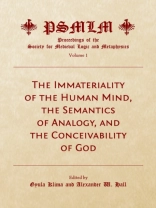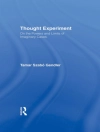The Immateriality of the Human Mind, the Semantics of Analogy, and the Conceivability of God brings together the work of experts in the field of medieval philosophy to consider the nature of God and the soul, what can be known of the divine essence and the semantics of theological discourse from the perspectives of medieval theology (both natural and revealed), logic and natural philosophy. In his capacity as an arts master commenting on a work of natural philosophy, Aristotle’s De Anima, John Buridan discusses the immateriality of the intellect against the background of the competing, mutually exclusive views of Alexander of Aphrodisias and Averroes. Aquinas takes up the same issue, but in a more properly theological setting, in his Commentary on the Sentences of Peter Lombard, where Aquinas argues that the being of the intellect is independent of matter. Thomas de Vio Cajetan considers the semantics of theological discourse or ‘God talk’ in order to derive a proper means to speak of the divine essence in his De Nominum Analogia; and Anselm of Canterbury’s Proslogion seeks with unaided reason to develop a single proof whereby those who think seriously of anything as ‘that than which nothing greater can be thought’ may know that God exists.
Gyula Klima
Immateriality of the Human Mind, the Semantics of Analogy, and the Conceivability of God (Volume 1 [PDF ebook]
Proceedings of the Society for Medieval Logic and Metaphysics)
Immateriality of the Human Mind, the Semantics of Analogy, and the Conceivability of God (Volume 1 [PDF ebook]
Proceedings of the Society for Medieval Logic and Metaphysics)
购买此电子书可免费获赠一本!
格式 PDF ● 网页 120 ● ISBN 9781443833905 ● 编辑 Gyula Klima ● 出版者 Cambridge Scholars Publishing ● 发布时间 2011 ● 下载 6 时 ● 货币 EUR ● ID 2611370 ● 复制保护 Adobe DRM
需要具备DRM功能的电子书阅读器












